With the national badminton team spending July at home, two domestic teams have crossed oceans this week to give their players some Grand Prix action. But while the Korea National University of Sports takes on a world class field in Canada, veteran Lee Kyung Won (pictured) leads the Samsung Electromechanics team as they head way Down Under to strut their stuff in Melbourne at the Yonex Australia Open Grand Prix. The team spoke to Badzine during their last training session before their departure for Australia.
By Don Hearn, Badzine Korea correspondent. Photos: Badmintonphoto (archives) and Don Hearn
Samsung Electromechanics has long been Korea’s premier pro badminton team. The team was founded in 1996 and all but one of Korea’s Olympic gold medallists and three more silver medallists since then have been Samsung players. Every member of the coaching staff is either a former national team coach, an Olympic gold medallist, or both. Next week, the entire Samsung team, minus Paris-bound Lee Yong Dae and Lee Hyo Jung, will be in action in Australia.
Current national team members Lee Kyung Won, Cho Gun Woo, Kim Min Seo, and Kang Hae Won will be joined by eight Samsung teammates, including Athens Olympians Park Tae Sang and Seo Yoon Hee, and former national champion Hwang Hye Youn.
The Koreans’ best hopes are for Lee Kyung Won, in her first international appearance since clinching the winning point in Korea’s Uber Cup final victory, and Cho Gun Woo, who was crowned Asian Champion in April and who just two weeks ago reached his first Super Series final, in Indonesia. But the thirty-year-old Lee and the 21-year-old Cho are both rather new to the role of being the veteran partner having to provide the anchor of experience.
Cho Gun Woo (pictured) was born 12 days before Lee Yong Dae, his long-time partner and classmate since elementary school, but by the time they played their last junior event together in 2006, Lee had already spent 4 years on the national team while Cho was just getting started. Since graduating to the senior circuit in 2007, Cho has partnered veterans like Han Sang Hoon, Yoo Yeon Seong, Kang Myeong Won and now Kwon Yi Goo.
“Next week, I’ll be playing with Kim Dong Min and since it’s his first international tournament, it will be very different. We expect to meet the top Malaysian pair in the quarter-finals and we’ll do our best to come up with a good result,” said Cho.
Cho insists on being realistic about his recent success. “It isn’t that I have improved so much. In Indonesia and India, we didn’t have to face any of the very top pairs. The pairs we beat were all between the world’s #8 and #15. Had we had to play top 5 pairs, the results would no doubt have been very different.”
When the nation calls…
Like his former Samsung teammates Jung Jae Sung and Han Sang Hoon, Cho has apparently been called for military service, which would put him in uniform throughout the two-year run-up to the London Olympics but from which only an Asian Games gold medal could exempt him.
“I’m trying not to think about that and to just concentrate on my playing for now,” says Cho. “It might be true that the Asian Games could change things but we have a lot of good players and the competition will be stiff to even make the team for Guangzhou. That is still a goal, though, and right now, [Kwon] Yi Goo and I will be concentrating on trying to improve and to boost our ranking with good results in Macau and Taiwan this summer.
“My game still needs improvement in the same areas as always. I still don’t move fast enough to play against the top men’s doubles pairs and I also need to work on my net play. My defensive play is good but my net play needs work so that’s something that I’m improving little by little.”
Samsung head coach Kwon Seung Taik explained “The players are really looking forward to playing in Australia, especially those who aren’t on the national team and only get to compete in a few domestic tournaments each year.
“But it’s good for the national team players too. In Super Series events, it’s very difficult to advance past qualifying or past the early rounds and it can be demoralizing. If they can go to a smaller tournament like this and do well or maybe even win, it gives them confidence and motivates them to keep improving to do well in the major tournaments.
“Plus, they are more likely to get more match experience, unlike the Super Series, where sometimes they might play a strong opponent in the first round or in qualifying and then have to go home having only played once.”
While excursions like this one may be reminiscent of efforts by the Djarum team in Indonesia or the KLRC in Malaysia to give tournament experience to players outside the national team, Kwon explained that it was a very different paradigm in Korea.
“Many of our players are also on the national team and we need to get permission from the Badminton Korea Association to take our players to a tournament like this. Also, we have to select a tournament that the national team isn’t already sending players to and find a time in the tournament schedule where all of our players have time to train together to prepare. All that means that this can’t happen more than once a year.”
Two players who are looking forward to the Australia Open are former singles headliners Seo Yoon Hee and Hwang Hye Youn. Hwang (pictured) is a two-time national champion who has won bronze in the Asian Games and the All England but she injured her foot last October and was finally dropped from the national team in early February when it turned out that her recovery would involve her leg going back into a cast for another month. Hwang has not competed internationally or nationally yet this year but in training, she showed no mobility problems whatsoever as she floated around the court, chasing down backhand after backhand and schooling veteran Park Tae Sang with her precision placement.
No comeback, but still something to prove
But if Hwang has slipped into obscurity with the success, during her absence this year, of Sung Ji Hyun, Bae Youn Joo, and Bae Seung Hee, team-mate Seo Yoon Hee has been all but forgotten beyond Korea’s shores. Seo was once a dangerous international competitor who was capable of taking down such aces as Pi Hongyan and Wang Chen. She left the national team in 2007 and has not competed overseas since. However, despite being on a roll in domestic events recently – losing to Bae Youn Joo in the nationals last December and winning the Summer Championship title last month – Seo insists that we will not see her make a comeback as Bae Seung Hee did two years ago.
“Life is much more enjoyable now that I am just playing with my team. I like it here,” explains Seo, watching her teammates train beneath banners covered in caricatures of all of the players, hung there partly for the benefit of a recreational club / cheering squad that uses the gym in the evenings. “I can relax and enjoy playing. When I was on the national team, it was very stressful. There was a lot of pressure to do well in international tournaments.
“I’m actually in top condition now,” says Seo, who still has her goals, even on the domestic circuit. In fact, Seo’s runner-up finish at the nationals in December was her fourth time coming up short she watched a third straight national champion climb past her up the podium. “I’ve been close many times but never won the nationals so I’d really like to finally win it.
“Next week, I’m just going to do my best and I hope to have a good result.”
Lee’s Career to end in Guangzhou
If the Australia Open will see young Cho Gun Woo dabbling in big-brotherhood for a week, Lee Kyung Won’s recent transformation is both different and more important. Ten years ago, Lee Kyung Won was in the top ten as a women’s singles player and before the first year of the new millennium was out, she would play in the semi-finals of three major tournaments and take the national singles title. Starting in 2001, however, she became the new doubles partner of the great Ra Kyung Min, who at that time had already collected an All England title and silver medals at the Asian Games and the World Championships all in women’s doubles.
“I had so much to learn from Kyung Min from 2001 until the Athens Olympics, where we won the bronze medal,” said Lee. “She really helped me a lot. Then in 2005, I started playing with Lee Hyo Jung and by that time, I had improved a lot and we had a successful partnership.
Next week, Lee will be paired with Kim Min Seo (who recently changed her name from Kim Mi Young). Kim (pictured with Lee) is 23, like Lee’s more regular partner this year, Ha Jung Eun. Perhaps surprisingly for such a seasoned veteran, this is Lee’s first year as a veteran mentor and nowhere was this more important than in the Uber Cup finals.
“We were so surprised when we won the Uber Cup this year,” said Lee. “Of course, we always had a chance in each of my five times playing in the Uber Cup, this time I was the oldest member of the team and winning the Cup was an important milestone in Korean badminton history that everyone was looking forward to.
“Hyo Jung and I had beaten Chinese pairs before but the other girls hadn’t and they were always so nervous when they played the Chinese so it was really important for us to show them the way, to give them the taste of winning.
“For me and my career, the Asian Games will be the end. Rather than the individual event, I see my role as being to once again lead the younger players. I don’t even know who I’ll be playing women’s doubles with. It’s getting harder as I’m not so young anymore and there are a lot of good younger players coming up to make room for.
“I’ve already won gold at the Asian Games and I feel I’ve been so lucky to have partnered such top players as Ra Kyung Min and Lee Hyo Jung. They really are two of the world’s best players.”
Asked how much she would regret retiring without Olympic gold, Lee responds “It was hard to settle for silver in the Olympics because I injured my ankle in the final and at that point, we didn’t know whether we could still have won it. But this Uber Cup victory is really a big deal. Especially beating Du Jing and Yu Yang in the last match – since that’s who beat us in the Olympics – that really helps to ease the regret from Beijing. The Olympics was two years ago and the Uber Cup is a high note on which to end my career so it gives me great happiness.
“I was very disappointed that the Uber Cup wasn’t televised. It was a historic win and we didn’t know ourselves if we would be able to beat China in the final. I understand it from the TV stations’ perspective but it is still disappointing.”
Lee Kyung Won is known for her exuberance on court but this is not restricted to major championships. In training with her Samsung team-mates, she is just as keen to win and shouts encouragement to her partner while fighting for every point.
“Next week in Australia, we’re again doing this for the good of the team so we’re going to play hard and give it our best shot,” says Lee. And we know that on that count we can take her at her word.
![KOREA – Samsung seeks gold in the Deep South With the national badminton team spending July at home, two domestic teams have crossed oceans this week to give their players some Grand Prix action. But while the Korea National […]](http://www.badzine.net/wp-content/uploads/Samsung-Seo-Hwang-Park-450_thumb.jpg)
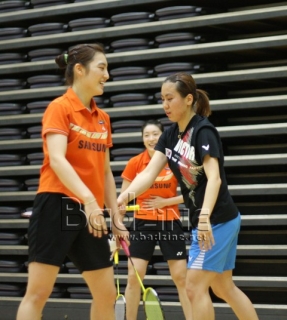
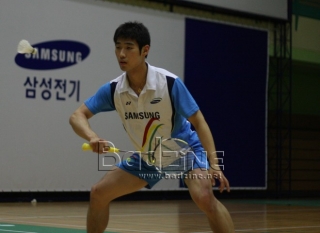
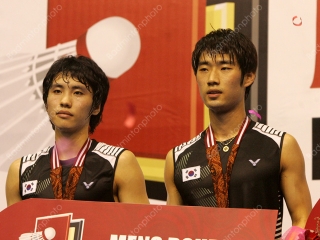
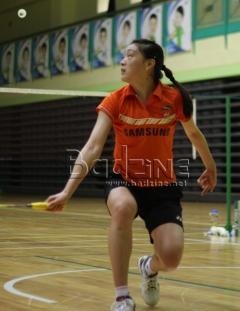
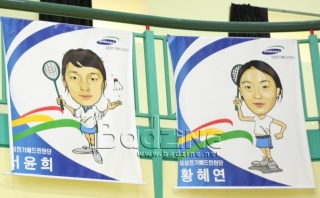
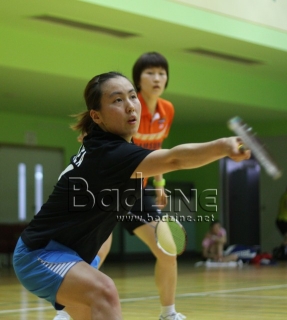
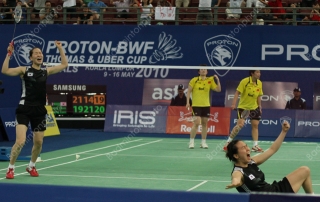
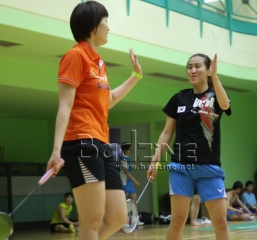

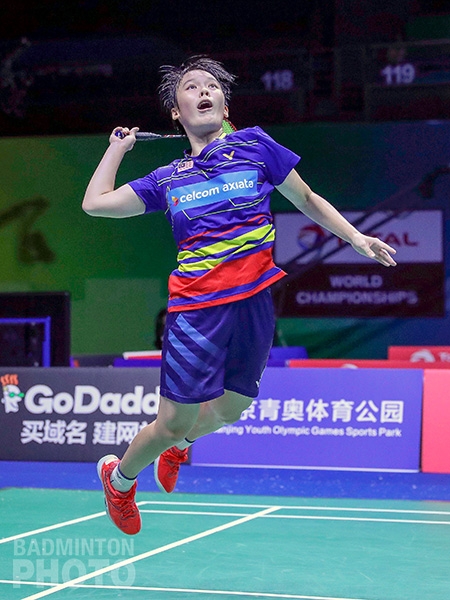
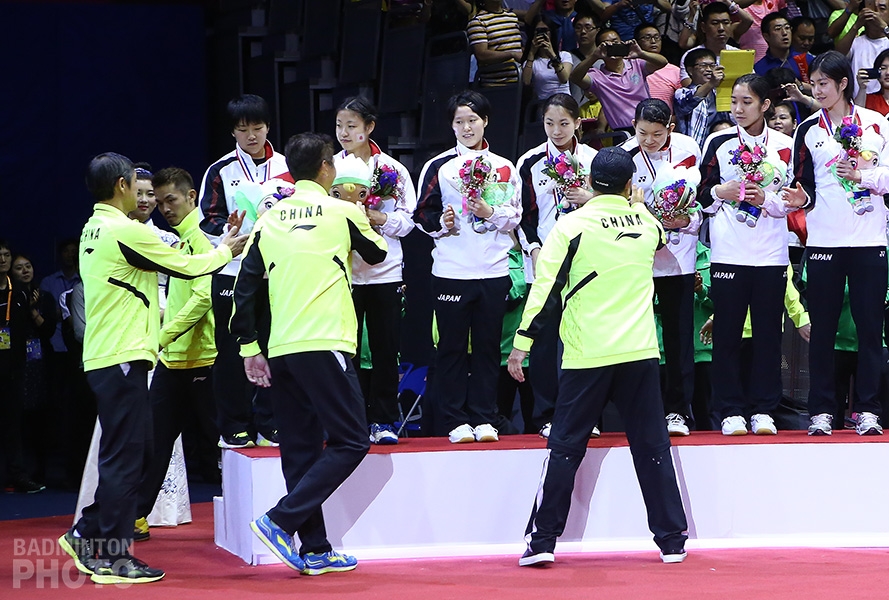
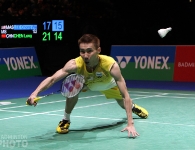
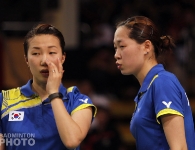
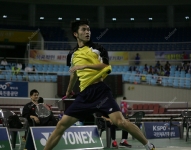
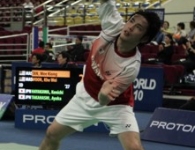
Leave a Reply